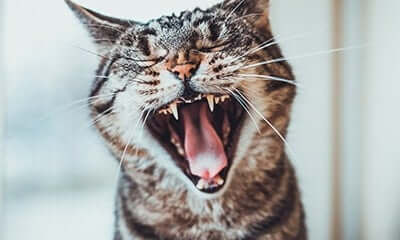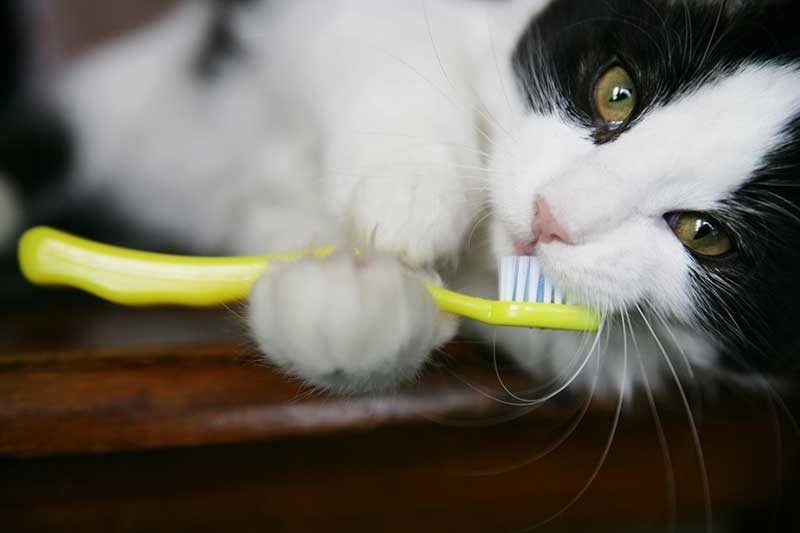Dental Disease in Cats and Dogs

Did you know that dental disease affects 85% of dogs and cats that are at least 4 years old? Periodontal disease starts as bacteria and plaque on the teeth that progresses to tartar and calculus. The bacteria, plaque, tartar and calculus can irritate the gums, and cause them to become infected, tender, red, and swollen. Eventually, inflamed gums separate from the teeth, creating pockets that can trap more bacteria. These pockets deepen and bacteria may attack the roots of the teeth and the bony tissue of the jaw, which can cause teeth to loosen, the gums to bleed, mouth odor, and pain when your pet eats.
The Risks of Dental Disease
Bacteria from the teeth and gums can enter the bloodstream and may travel to major organs and begin infection there. Among organs that are most often affected are the lungs, heart, kidneys, and liver. These infections are usually treatable when caught at an early stage. However, they can cause serious damage to these organs.
Two Important Steps to Prevent Harmful Dental Disease
Step 1: A Dental Exam
A dental exam should be performed by a licensed veterinarian, and if needed, a dental prophylaxis and any treatment will be recommended.
More commonly referred to as cleaning, dental prophylaxis includes:
- Tartar and plaque removal by ultrasonic scaling
- Sub-gingival scaling and curettage (cleaning below the gum line)
- Polishing to reduce the rate of future tartar buildup
- Exam and probing of teeth for periodontal pockets
- Antibiotics
Dental prophylaxis is done under a general anesthetic to allow maximum thoroughness. Sedation allows us to effectively clean and polish the teeth, as well as provide a complete assessment and to treat problems.
Step 2: At Home Dental Care
Brushing & Toothpaste
- Look for a toothbrush with soft bristles to avoid hurting your dog or damaging its gums. Finger brushes are available and are smaller for puppies and kittens.
- Never use human toothpaste for pets. There are specific animal toothpastes that come in special flavors (chicken, seafood, and malt).
- Studies have shown that brushing three times a week was adequate to maintain healthy teeth and gums but daily brushing was needed to control existing gingivitis.
Diet & Treats
- Chewing on a proper dental chews daily can substantially reduce plaque and tartar in your pet.
- Ask our team more about Virbac C.E.T. line of dental treats next time your in!

Effective Dental Care Services that Support Your Pet’s Overall Health
At Dupont Veterinary Clinic, we conduct thorough oral examinations under sedation to ensure a comprehensive assessment. Our dental services encompass ultrasonic scaling, polishing, and extractions (when necessary). We understand that pet parents often worry about tooth extractions, but dealing with a broken or decaying tooth is vital to the well-being and comfort of your pet. Leaving a rotten tooth untreated can lead to severe health issues, discomfort, and pain.
We offer a discount on our dental services and honor these discounts within 90 days of the wellness exam if recommended by a veterinarian. We are dedicated to your pet's dental health year-round, not just during Dental Month in February.
Your pet's smile is always our priority, so reach out today to schedule an appointment.

